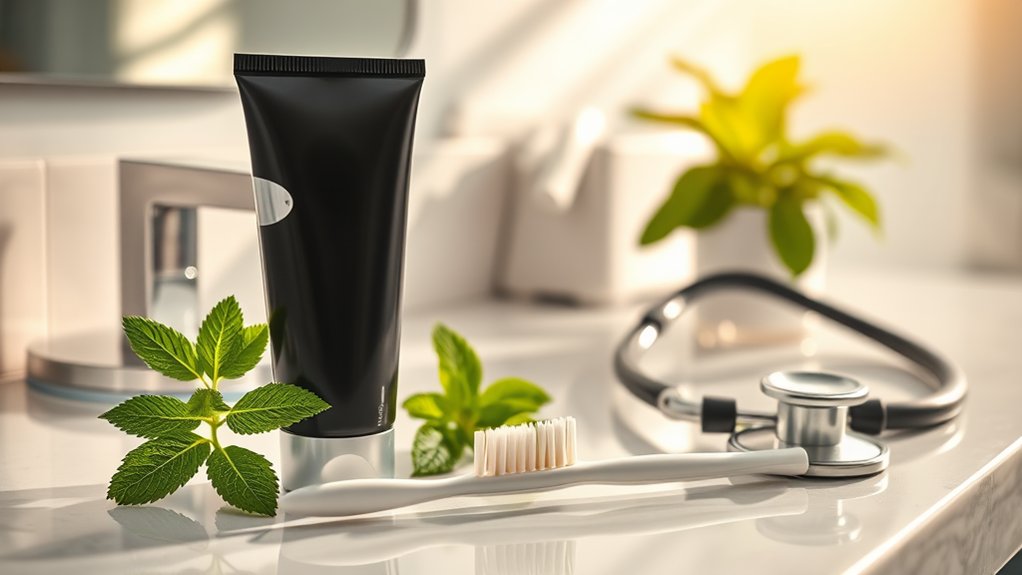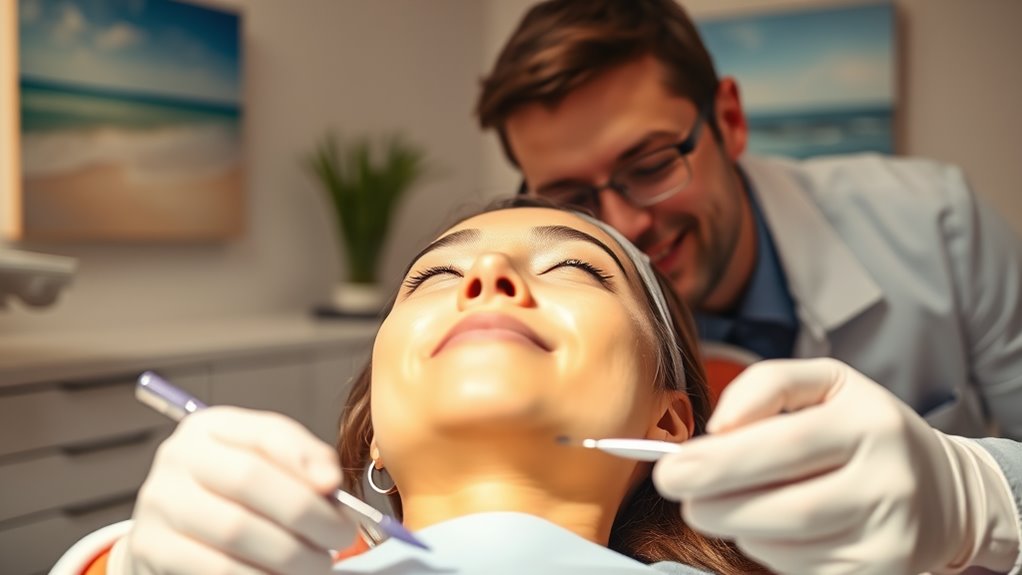Is Charcoal Toothpaste Safe. What Dentists Say
Charcoal toothpaste can sparkle like a star in the teeth-whitening universe, but is it truly safe for your smile? While many are eager to embrace its detoxifying claims, dental professionals caution against potential risks. Enamel wear and sensitivity may lurk behind its alluring promises. To ensure your oral health remains intact, you’ll want to explore what experts really recommend before making any decisions.
What Is Charcoal Toothpaste?
Charcoal toothpaste has gained popularity in recent years as a trendy oral care product that claims to enhance whitening and provide detoxifying benefits.
Made from activated charcoal, this type of toothpaste is marketed as a natural alternative to conventional whitening pastes. Its proponents suggest that charcoal toothpaste can absorb stains and impurities from your teeth, giving you a brighter smile.
However, while it’s touted for its potential benefits, the scientific evidence supporting these claims remains limited.
If you’re considering charcoal toothpaste, it’s essential to consult with your dentist to ensure it aligns with your oral health needs.
How Does Charcoal Toothpaste Work?
While many enthusiasts praise the benefits of charcoal toothpaste, it’s important to understand how it actually works. Activated charcoal, made from carbon-rich materials, adsorbs substances in your mouth. Its porous structure binds to stains and toxins, helping to remove them during brushing. Here’s a quick overview:
| Mechanism | Description |
|---|---|
| Adsorption | Binds to stains and impurities. |
| Scrubbing | Provides a gentle abrasive effect. |
| pH Balancing | Can help neutralize acidity. |
| Toothwhitening | May improve appearance of teeth. |
| Freshening | Reduces bad breath by trapping odors. |
Understanding these mechanisms can help you evaluate its use.
Potential Benefits of Charcoal Toothpaste
You might find that charcoal toothpaste offers potential benefits such as whiter teeth and effective odor neutralization.
Its natural ingredient appeal can also attract those seeking alternatives to conventional toothpaste.
While these advantages are notable, it’s essential to evaluate the overall safety and long-term effects of using charcoal in dental care.
Whiter Teeth Results
How effective is charcoal toothpaste in achieving whiter teeth?
Charcoal toothpaste often claims to remove surface stains due to its abrasive properties, which can contribute to a brighter smile.
Some users report noticeable whitening after consistent usage, but scientific evidence is limited. While it may offer minor improvements, dentists caution against overuse, as excessive abrasion can wear down enamel.
For best results, incorporate charcoal toothpaste into a broader oral hygiene routine, alongside regular dental check-ups.
Ultimately, relying solely on charcoal toothpaste for whitening isn’t advisable, and you should consult with your dentist for more effective and safe alternatives.
Odor Neutralization Benefits
Charcoal toothpaste is often touted for its ability to neutralize odors in the mouth, making it a popular choice for those seeking fresh breath.
This effectiveness stems from activated charcoal’s adsorptive properties, which can help trap bacteria and food particles responsible for bad breath.
- Removes odor-causing bacteria
- Helps maintain a clean feeling in your mouth
- Promotes fresher breath throughout the day
- Acts as a natural deodorizer
While it’s important to choose a charcoal toothpaste that’s safe and effective, its odor-neutralizing benefits are worth considering for your oral hygiene routine.
Natural Ingredient Appeal
Many consumers are drawn to the appeal of natural ingredients in their oral care products, and charcoal toothpaste fits this trend perfectly. Charcoal, known for its absorbent properties, can help remove surface stains, providing a whiter appearance. Additionally, it’s often touted for its potential detoxifying effects, which may contribute to improved gum health.
| Potential Benefits | Considerations |
|---|---|
| Natural whitening | Abrasiveness can wear enamel |
| May reduce bad breath | Not a substitute for fluoride |
| Detoxifying properties | Limited research on long-term use |
| Eco-friendly option | Quality varies among brands |
Always consult your dentist before trying new products.
Risks and Concerns Associated With Charcoal Toothpaste
When using charcoal toothpaste, you should be aware of its abrasiveness, which can wear down your enamel over time. This erosion not only weakens your teeth but may also increase your risk of stains and discoloration. Furthermore, thinning enamel can expose sensitive layers beneath, leading to increased sensitivity and discomfort. Understanding these risks is crucial for making informed decisions about your oral health.
Abrasiveness on Enamel
Although charcoal toothpaste is often marketed for its whitening benefits, concerns about its abrasiveness on dental enamel can’t be overlooked.
Research indicates that excessive abrasiveness can lead to enamel erosion, making teeth vulnerable to decay and sensitivity. When considering charcoal toothpaste, keep the following points in mind:
- It may contain coarse particles that can wear down enamel.
- Prolonged use can lead to irreversible damage.
- Enamel erosion is often irreversible and may require dental intervention.
- Regular dental check-ups are essential to monitor enamel health.
Thinking critically about these risks can help you make informed choices about your oral care routine.
Staining and Discoloration Risks
While charcoal toothpaste is promoted for its potential whitening effects, it’s crucial to consider the risks of staining and discoloration that can arise from its use. Charcoal can trap pigments from food and beverages, leading to more stains on your teeth. Additionally, inconsistent use may result in uneven whitening, accentuating stained areas.
| Risk | Description |
|---|---|
| Staining | Charcoal can absorb pigments, causing discoloration. |
| Uneven whitening | Potential for inconsistent results and patches. |
| Abrasiveness | May worsen discoloration over time. |
| Long-term effects | Unknown consequences of prolonged use. |
What Dentists Recommend
Many dentists express caution regarding the use of charcoal toothpaste, emphasizing that its abrasive nature can wear down enamel over time.
They often recommend alternatives that are safer for your teeth while still providing effective cleaning.
- Use fluoride toothpaste to remineralize enamel.
- Choose products approved by dental associations.
- Limit charcoal toothpaste use to occasional use, if at all.
- Maintain regular dental check-ups for professional guidance.
Additionally, excessive use of charcoal toothpaste can lead to increased sensitivity as a result of enamel wear.
It’s vital to prioritize your dental health, so consider these recommendations before incorporating charcoal toothpaste into your routine.
Your smile deserves the best care possible.
Alternatives to Charcoal Toothpaste
If you’re looking for effective alternatives to charcoal toothpaste, several options can help maintain your oral health without the risks associated with abrasive ingredients.
Consider fluoride toothpaste, which strengthens enamel and prevents cavities.
Baking soda-based toothpaste is another gentle option that can naturally whiten teeth without damage. You might also explore whitening strips or gels that contain hydrogen peroxide, which are proven to be safe and effective.
Natural toothpaste options, infused with essential oils or plant extracts, can support oral hygiene while being less abrasive. Additionally, look for natural sweeteners that can enhance taste without posing long-term health risks.
Consult your dentist for personalized recommendations tailored to your specific needs.




